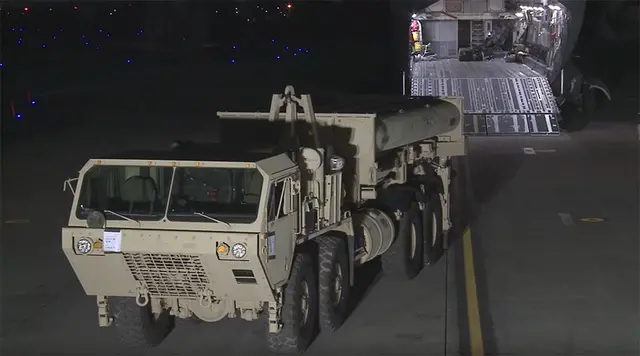South Korean President Moon Jae-in has decided to suspend the additional deployment of the US anti-missile Terminal High Altitude Area Defense (THAAD) system, citing the need for an environmental impact assessment (EIA). This decision was made days after the country's Defense Ministry intentionally omitted details of the THAAD installment from its reports to him. Moon's decision will prolong the entire process of THAAD's deployment, and as a result the US is now suspicious of the defense system's future.
Moon's office said in an interview Wednesday that the entire THAAD battery would occupy 700,000 square meters and that the site will be subject to an environmental review. The country's Environmental Impact Assessment Act stipulated that construction sites over 330,000 square meters must go through a full-scale EIA, and only a small-scale assessment is required for a site less than 330,000 square meters. To speed up THAAD's deployment, South Korea's Defense Ministry intentionally divided the battery's construction site into two parts, with the first allocated to occupy 328,970 square meters, deliberately designing the site into an upside-down U-shape trying to confuse the area for military facilities with that of THAAD in an attempt to skip the EIA.
The Blue House believes that the THAAD site has to go through an environmental review now that it has been revealed the Defense Ministry attempted to improperly skip the EIA. THAAD's deployment is not that urgent and its additional installment should wait until the EIA is over.
Moon's office announced its intent to carry out an official EIA, rather than a small-scaled environmental review. While a small-scaled environmental review is usually expected to take six months to complete, a full-scale review may last for over a year and is highly likely to postpone THAAD's deployment to next summer. For example, Washington once spent 23 months assessing the environmental impacts of the THAAD system in Guam.
The twists and turns in THAAD's deployment are rooted in South Korea's political upheavals. Moon's attitude on the anti-missile system is in stark contrast to his predecessor Park Geun-hye. While Park attached great importance to THAAD's deployment and hastily pushed the battery's installment, Moon has focused more on THAAD's legitimacy, transparency and democracy, and does not regard its deployment as a priority.
The environmental review is unlikely to negatively affect South Korea's relations with the US. Seoul and Washington have already discussed this issue at length. South Korea's head of National Security Office Chung Eui-yong met with his US counterpart H.R. McMaster in Washington earlier and voiced the necessity of an EIA to ensure the legitimacy of the THAAD system. Washington has expressed understanding of Seoul's decision, and thus the environmental review is unlikely to affect the summit talks to be held at the end of this month.
However, the US is still suspicious that Moon may take issues of legitimacy as an excuse and eventually attempt to withdraw THAAD's deployment after a long-term suspension. How long the system would be suspended is now the most unpredictable factor, especially following Moon's decision to probe into the Defense Ministry's intentional omission of THAAD's details.
Commander of US Forces Korea Gen. Vincent K. Brooks and Director of the US Missile Defense Agency James Syring visited Seoul and talked with Chung regarding the THAAD system on June 5 in an attempt to dispel the Blue House's misunderstandings on THAAD.
Chinese Foreign Ministry Spokesperson Hua Chunying was cautious when asked about the EIA at Wednesday's press conference. This is because Moon's administration had clarified earlier that even if an EIA is needed, there would be no reason to withdraw the THAAD launchers and X-band radar previously installed. The radar detected North Korea's launch of mid-range ballistic missiles last month. So despite an upcoming EIA, the equipment that has already been deployed is expected to continue to operate.
(GBTIMES)
 简体中文
简体中文

